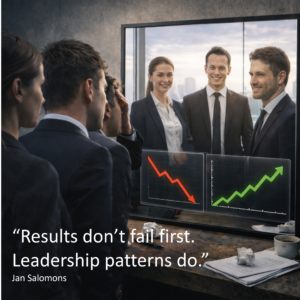Make strong emotions work in your advantage

Mastering your emotions in a VUCA world
In the fast-paced and demanding world of work, strong emotions are inevitable. They can either propel us forward or hold us back — depending on how we deal with them. Emotions are part of being human, not a problem to solve. When leaders learn to reframe their emotional responses, they gain an edge: they turn tension into insight and pressure into performance.
Take a simple example: a team leader feels frustrated after yet another project delay. Beneath that frustration lies commitment, accountability, and a desire for progress. By reframing the situation — asking what’s this emotion really telling me? — frustration becomes fuel for improvement instead of friction.
In a VUCA environment — volatile, uncertain, complex, and ambiguous — emotions are amplified. Volatility triggers stress, uncertainty causes self-doubt, and complexity easily overwhelms. The ability to reframe emotions is what helps leaders stay centered, confident, and effective when everything around them is in flux. It’s not about suppressing emotions; it’s about turning them into signals for smarter action.
Embrace the upside of strong emotions
Strong emotions like passion, determination, and even anger often carry a positive charge. They’re proof that you care deeply about your work and its outcomes. Instead of fighting them, use them. Passion fuels innovation. Anger can highlight boundaries or injustice. Determination pushes teams through obstacles. Once you see emotions as data — not as danger — you can use them to drive better decisions and stronger leadership.
Understand the source
To master emotions, you must first understand them. Ask yourself: What triggered this? Is it a workload issue, unclear expectations, or something deeper — like a fear of losing control or recognition? Emotions often point toward unmet needs or violated values. By tracing them back to their root, you move from reaction to reflection — and from blame to learning.
Cultivate emotional intelligence
Emotional intelligence (EQ) remains one of the most powerful leadership differentiators. High-EQ leaders don’t suppress emotions — they understand and integrate them. They recognize how emotion affects decision-making and the energy of their teams. Start by observing yourself in key moments: What do you feel, why, and how does it show? Harvard research repeatedly shows that emotional intelligence outperforms IQ as a predictor of leadership success. The good news: EQ can be developed through awareness, feedback, and practice.
Channel emotion into action
Emotion is raw energy. The key is how you direct it. When you feel strong emotion, pause and reframe: What’s this telling me? What’s within my control? Then decide on one constructive action. For instance, turn disappointment into a coaching moment for your team, or channel tension into a renewed commitment to clarity and communication. Reframing emotions this way transforms setbacks into leadership opportunities.
Seek support and practice self-care
Even the most self-aware leaders can feel overwhelmed at times. The difference lies in how quickly they reset. Speak with a trusted colleague, coach, or mentor — someone who helps you think, not just react. And never underestimate the basics: rest, exercise, reflection, and moments of silence. Self-care isn’t indulgence; it’s your foundation for emotional control and decision quality.
The leadership lesson
Strong emotions don’t make you a weak leader — they make you a human one. The difference between reacting and reframing determines whether emotion drains your energy or fuels your growth. In the VUCA world, this is the new leadership edge: transforming emotion into insight, pressure into purpose, and disruption into direction.
Reflection for leaders
Think back to a moment when emotion took over. What was really driving it — fear, values, or ambition? What would happen if, next time, you paused and reframed it as feedback rather than frustration?
Work with me
I regularly coach leaders who find dealing with strong emotions difficult — especially under pressure. Learning to reframe your emotional responses is a skill you can master with practice and personalized tools. If this resonates with you or your team, let’s connect. Together we can turn emotional energy into stronger leadership, better decisions, and more sustainable performance.




